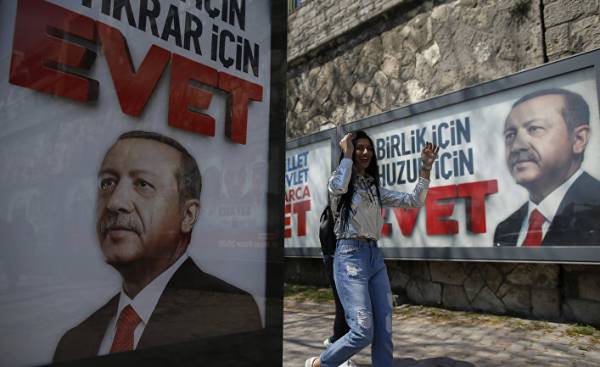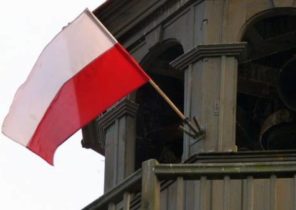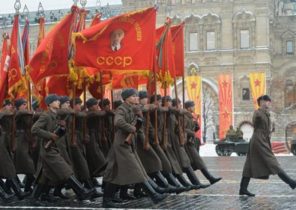
On Sunday, Turkish President Recep Tayyip Erdogan received a mandate of one-man rule from most parts of the country, but not cities.
In Istanbul, Ankara, Izmir are concentrated about 46% of the volume of production of Turkey and only 23% of its population. All three cities voted against the retention of emergency powers Erdogan turns Turkey into a presidential Republic. In the same way as the American President, Erdogan will be able to form a Ministry and appoint judges, and to be a member of a political party.
Impotent rage from the fact that the vote was won by the provincials, familiar to residents of large American cities. After the vast majority of residents in November voted against trump, they went out to protest on the streets: similarly, like many residents of Istanbul, Izmir and Ankara late on Sunday evening. The same thing happened in Warsaw (voted against the nationalist party PiS in 2015) and London (opposed Breccia). If marine Le Pen will lose the upcoming presidential election in France, France will be at the country club, where he won the choice of big cities. It happened during the presidential election in Austria in 2016 and during the parliamentary in the Netherlands, a month ago, liberal candidates with the support of townspeople defeated the nationalists, supported mainly by the people of the province.
Even in countries where authoritarian regimes are firmly holding their positions in the big cities they are relatively unhappy. Moscow regularly shows weaker support for Putin in the elections. Fidesz party of Viktor Orban, in 2014, won all but support in Budapest was received with difficulty.
The separation between the citizens and provincials often due to the fact that successful globalization live in cities, while the losers remain beyond them. This somewhat simplistic view. Erdogan was mayor of Istanbul, he never lost an election, but 51.4% of the commercial capital of the country rejected his constitutional amendment. Those who supported Brakcet not oppose globalization and free trade, otherwise they wouldn’t be so excited from the experience of Singapore. The ideology of Putin, Orban and Yaroslav Kaczynski PiS not an isolationist. The gap between large cities and the heart of the country, existing in many countries, not only because of globalization. We are talking about two types of social identity that are increasingly difficult to reconcile in the state bodies.
The first — the traditional national patriotism. In any state policy calling for it, and those who speak convincingly win the votes of the province, whether States or Turkey. It is the language of military power, adherence to traditions and often the desire for a Golden past.
On the other hand, the energy of the strong cities comes not from cosmopolitanism or globalization. The Harvard University sociologist Daniel bell and political philosopher Avner de-Shalit of the Hebrew University of Jerusalem in the book dedicated to the city’s identity, call it “citizenship” (principle of equality of rights and duties of citizens): “the City is increasingly becoming the mechanism by which people oppose globalization and its tendency to smooth out the differences in our cultures until the monotony. Many cities are investing time and money for the sake of preserving their unique character with the help of design, architecture and the ways people interact with the city.”
I’m more a Muscovite than the Russians. Now, living in Berlin, I feel like a big Berliner than a German. According to polls, few years ago, many people in London identified themselves more with the city than with the UK, I have met people who considered themselves first and foremost new Yorkers, and then by the Americans — a sense heightened by the policy of trump against immigrants.
Istanbul is an ancient metropolis where the local identity is stronger than national. It could be called cosmopolitan, but it is also a city with its own soul, different from the other places that are affected by a few thousand years. The nature of the city requires more decentralized and chaotic system of governance than the one that dragged Erdogan in the referendum. So, many residents of Istanbul who supported Erdogan in the previous elections, have distanced themselves from his latest reforms.
“Civics” has no political language other than liberalism. The candidate, insisting on openness, tolerance and even permissiveness usually works better with the townspeople. In the metropolis the principle of “live and let live” is the basis of survival. Rigid religious rules and local customs that frequently lose their influence in the context of urban diversity, which weakens the tension between the neighbors. In addition, competition in the coexistence with millions of others, forcing more citizens to question authority and tradition.
The problem of the appeal to the inhabitants of the cities is that many electoral systems are struggling with them. A vivid example — the electoral College of the United States, giving disproportionate voice to smaller States. And politicians who like a rural audience, doing everything to strengthen the geographical advantage. PiS is seeking to expand the Warsaw constituency, adding to the city’s 32 community, to be able to seize control of the capital city Council in the next election. Erdogan, too, has repeatedly accused of fraud, because the party tried to build such electoral geography, which will help it to save power.
These barriers to political power in the cities is unlikely to help in the long run. Urbanization has become an irresistible trend all over the world. The population of the provinces is no longer growing at the same time, according to UN projections, in the next 15 years the urban population will increase by 1.5 billion In 1950, Turkey’s population is only 25% were urban dwellers; today live in Metropolitan areas 75% of Turks. And the larger the city, the less he likes the diversity of provincial nationalism and the desire for a “strong hand”.
Defeat Erdogan in the largest cities — a sign that his project, which he wants to strengthen his personal power and dominance of his party, there is a limit. The desire to strengthen the authoritarian system and weakening the system of checks and balances can lead to protests in major cities, which Erdogan may be carefully avoided: he needs to reassure the country after the brutality of the state of emergency and the controversial campaign to protect the constitutional amendments. To ignore the desire of cities — means swimming against the demographic tide. This short-sighted strategy that will give Erdogan a few years personal rule, but still will lead to changes in a violent way.







